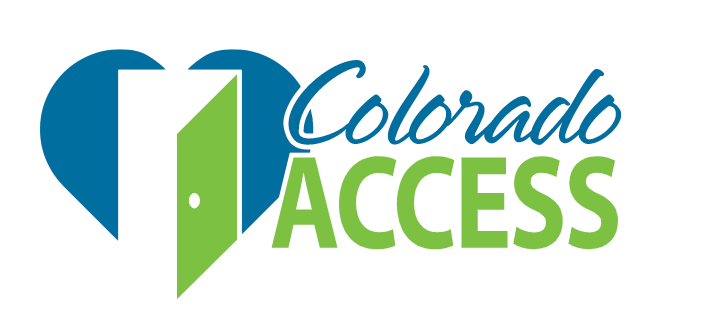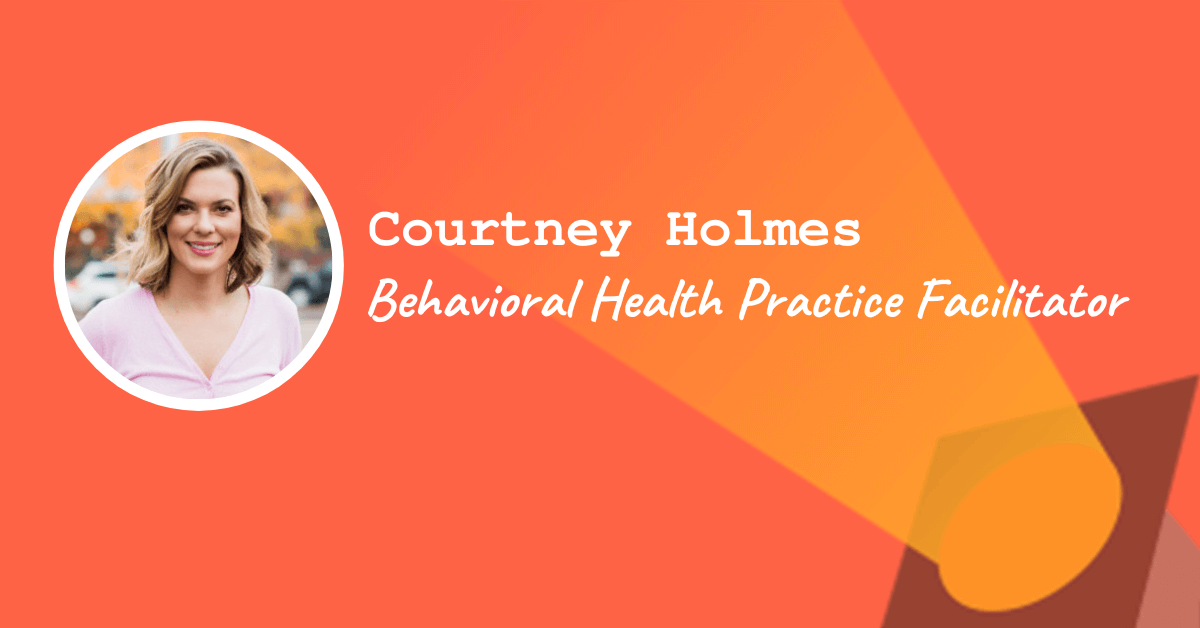This week’s spotlight is on Courtney Holmes, former COTA, who now works as Behavioral Health Practice Facilitator at Colorado Access!
This post may contain affiliate links or codes. This won’t increase your cost, but it helps keep TNCPT alive, and free of annoying ads! Thank you for your support. 🙂
What is your full name, title, and company name for your current, primary role?
Courtney Holmes—I have a background as a COTA.
Behavioral Health Practice Facilitator at Colorado Access.

Where are you located?
Denver, CO.
Where did you go to school to become a COTA, and what year did you graduate?
Pima Medical Institute, 2013.
I had an undergraduate degree in another field before going to COTA school.
What did you do when you first finished school, and for how long?
I began my clinical career in a small skilled nursing facility (SNF).
I only worked in this role for a few months before becoming the Director of Rehabilitation (DOR) at the same facility. The position was mostly clinical work with about 20% DOR work.
Please refrain from contacting our spotlight participants on social media. There are thousands of readers just like you out there. 🙂 Please ask your questions in the comments on this blog post.
If you’re a Non-Clinical 101 student, you can network with many of our spotlight participants in the alumni groups!
In what setting(s) did you work, and what types of patients did you treat?
Outside of student clinical rotations, I have only treated in SNFs and long-term care facilities.
What did you enjoy about your early roles? What didn’t you enjoy?
I loved my interactions with patients and colleagues. I still know many of my former co-workers to this day.
Like most, I did not enjoy the administrative aspects of clinical work, nor the burden that the for-profit medical systems put on clinicians.
What else have you done since then, prior to your current role?
After my initial DOR role, I took a position as DOR at a much larger facility, managing approximately 12-15 therapists.
During this time, I was also in graduate school at the University of Denver, where I obtained my Master’s in Healthcare Leadership and Regulatory Policy.
I based my thesis on my work experience as a DOR. This gave me plenty of real-life experience to share in job interviews as well.
Then, I worked for the state of Colorado in workers’ compensation. I educated doctors and mid-level medical providers about the biopsychosocial model of care, using data in medical decision-making, and tracking outcomes over time.
When and why did you decide to do something non-clinical?
I always had an exit strategy and was lucky enough to have the GI Bill, which covered four years of my education. I used it for my COTA degree and my Master’s degree.
What are you doing these days?
After becoming more involved in the behavioral-health side of workers’ compensation, I accepted a position with Colorado Access. We are one of the administrators of Medicaid in Colorado. I provide clinical operations and health system operations leadership to evolve Colorado Access’ approach to behavioral health delivery for Medicaid members.
In my current role, I coach behavioral healthcare practices on:
- Clinical workflows
- Process improvement
- Quality improvement process cycles
- Achievement of key performance
- Value-based clinical measures
- Community and clinical resources for complex patients
- Connections to similar practices for peer-to-peer learning and support
Are you still treating patients, or are you solely non-clinical?
I no longer treat patients.
How long have you been in your current role?
I have been in my current role for about two years. I have been out of clinical practice for over seven years.
Did you get any special certifications or training along the way to help you get into your current role?
I have a Master’s degree in Healthcare Leadership and Regulatory Policy.
How did you find your job? Did you apply or find it through a connection?
I applied for jobs through LinkedIn.
Did you do anything special to your resume and cover letter to land the job?
Yes!
The most important thing we can do as clinicians is to create a path and communicate our vision to prospective providers. We need to tell employers a story that makes sense.
I did this through my cover letters. For example:
“I’ve spent my career working toward positions that have a broader impact on the people I serve. Starting with my role as a rehab director, I helped to create treatment protocols to ensure fidelity and improve health outcomes across our company.
As a quality improvement specialist on the medical policy team at the state of Colorado, I focused on teaching medical providers the value of data-driven medical decision-making.
In my current role as a behavioral health practice facilitator, I address systemic issues that lead to poor behavioral health outcomes in the Medicaid population.”
How have people reacted to you leaving patient care?
I’ve had a wonderful experience with colleagues and external partners who value my experience as a clinician.
I know that I bring a valuable perspective as a clinician, and I am not afraid to share that.
What’s a typical day or week in the life like for you? What types of tasks and responsibilities fill your time?
My tasks and responsibilities include:
- Attending meetings and workgroups regularly
- Writing funding proposals
- Coaching practices to improve their outcomes
What are some of the rewards of your role? What are the biggest challenges?
The most rewarding aspect of my current role is helping practices improve the quality of care they deliver.
It can be challenging because we are somewhat of a middleman between the practices and the state Medicaid program. There are times when state policy does not exactly align with what is happening in clinical practice.
How did your clinical background prepare you for your role as Behavioral Health Practice Facilitator?
I constantly use the skills I learned in clinical practice.
Not only do I serve as a voice for the patients, but I also work with providers to improve outcomes and create policy around supervision.
Roughly speaking, how are the hours and pay compared to patient care?
I work about 40 hours per week, no holidays or weekends, and I have off most Fridays. I make more than I did as a practicing COTA and DOR.
Eager to launch your own non-clinical career?
What type of person do you think would do well in your role?
A good fit for this role is someone who can:
- Solve problems
- See issues through a macro lens
- Build relationships across the continuum of care
Do you work remotely or onsite?
I work remotely. I do occasionally meet at a practice in person to understand what they do and how I can support them.
What is a typical career path for someone in your role?
My role is similar to roles that are heavily weighted in quality improvement.
In terms of career advancement, I could take on more organizational-level projects and work with providers to address larger, system-wide issues.
What is next for you? What are your high-level career aspirations?
I love what I do right now. I hope to grow in my current role while possibly taking on more leadership and supervision responsibilities.
Do you have any special advice for others who want to follow in your footsteps?
Create a narrative about why you are doing what you are doing. Make the path you’re taking look intentional, and take on projects that will help you land your next role. You will be surprised what employers are open to, if you just ask.





